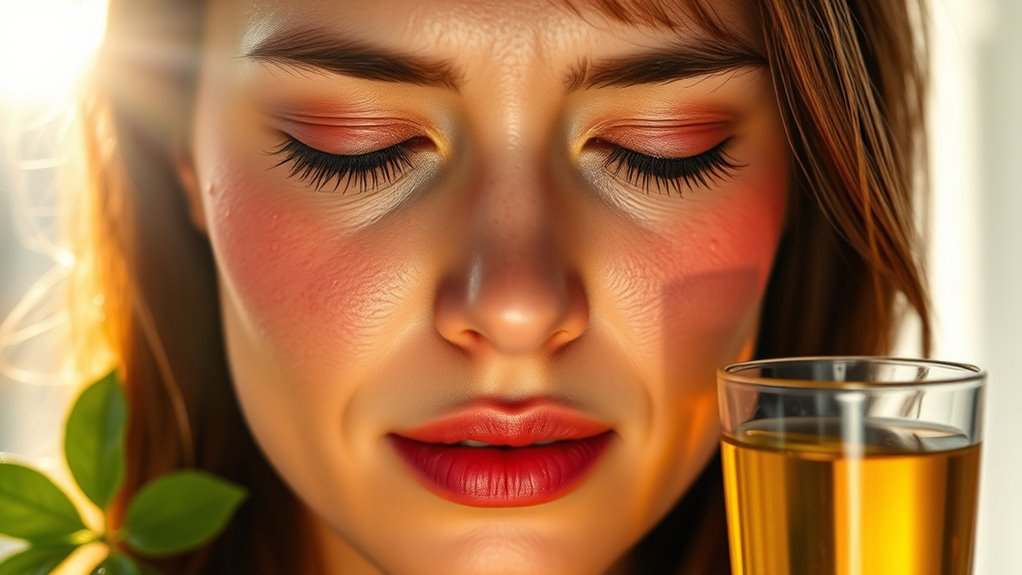Hot flashes happen when hormone levels, especially estrogen, fluctuate during menopause, causing your body’s temperature control to go haywire. You might experience sudden warmth, sweating, and flushing. To manage them naturally, avoid triggers like spicy foods, caffeine, and alcohol, and keep cool with breathable clothing and a comfortable environment. Incorporating foods rich in phytoestrogens, practicing stress reduction, and maintaining a healthy lifestyle can help. For more tips on easing hot flashes, discover how simple changes can make a difference.
Key Takeaways
- Hormonal fluctuations, especially estrogen decline during menopause, are the primary cause of hot flashes.
- Avoid triggers like spicy foods, caffeine, and alcohol to reduce hot flash frequency and intensity naturally.
- Incorporate phytoestrogen-rich foods such as flaxseeds, soy, and lentils to help balance hormones.
- Practice stress management techniques like meditation, deep breathing, and yoga to minimize hot flashes.
- Maintain proper hydration, sleep hygiene, and cool environments to help manage symptoms effectively.

Hot flashes are sudden, intense feelings of warmth that quickly spread through your body, often accompanied by sweating and a flushed face. These episodes can catch you off guard, disrupting your day and leaving you uncomfortable. One of the primary reasons behind hot flashes is hormonal fluctuations, especially during menopause, when your estrogen levels drop sharply. These hormonal shifts send signals to your brain’s thermoregulatory center, causing your body to overreact and trigger hot flashes. But it’s not just menopause—any hormonal imbalance, stress, or health condition can influence these sensations.
While hormonal fluctuations are a significant factor, lifestyle changes can also play a crucial role in managing hot flashes. Certain habits or environmental factors may exacerbate your symptoms, but small adjustments can make a noticeable difference. For instance, consuming spicy foods, caffeine, and alcohol often triggers hot flashes. By reducing or avoiding these, you might lessen the frequency and intensity. Wearing lightweight, breathable clothing and dressing in layers allows you to adapt quickly when a hot flash hits. Keeping your living space cool and well-ventilated can further help prevent overheating, especially during warmer months or in stuffy environments.
Stress management is another vital aspect. High stress levels can lead to hormonal imbalances, making hot flashes worse. Incorporating relaxation techniques like deep breathing, meditation, or yoga into your daily routine can help stabilize your mood and minimize triggers. Regular physical activity also plays a role; it improves circulation and helps regulate hormones. Just be cautious not to overexert yourself, as intense exercise can sometimes trigger hot flashes temporarily. Additionally, staying aware of environmental cues that may influence symptoms can help you better prepare and respond to hot flashes.
Dietary choices matter, too. Incorporating foods rich in phytoestrogens—plant compounds that mimic estrogen—may help balance your hormones naturally. Flaxseeds, soy, and lentils are good options. Staying hydrated is equally important, as dehydration can make hot flashes feel more intense. Ensuring you get enough sleep and maintaining a consistent sleep schedule can help your body better handle hormonal fluctuations, reducing the severity of hot flashes overnight. Additionally, practicing mindfulness techniques such as deep breathing or meditation can help manage stress levels and improve overall well-being.
Frequently Asked Questions
Can Hot Flashes Occur Outside Menopause?
Hot flashes can occur outside menopause due to factors like hormonal fluctuations or environmental triggers. You might experience them during pregnancy, with thyroid issues, or from certain medications. Stress, spicy foods, or hot weather can also set them off. If you notice hot flashes outside menopause, it’s essential to take into account these causes and consult a healthcare professional to identify the underlying issue and explore suitable remedies or treatments.
Are Hot Flashes Linked to Diet or Lifestyle?
Imagine you’re experiencing sudden flashes of warmth; you might wonder if diet or lifestyle play a role. Yes, hormonal fluctuations and dietary influences can trigger hot flashes. For instance, caffeine or spicy foods can exacerbate symptoms. You can manage this by avoiding such triggers, maintaining a healthy diet, and reducing stress. Your lifestyle choices directly impact hormone levels, so staying mindful of these factors helps lessen hot flashes.
How Long Do Hot Flashes Typically Last?
Hot flashes usually last from a few seconds to several minutes, depending on hormone fluctuations and your body’s temperature regulation. You might experience them multiple times a day or less frequently. While they can be unpredictable, staying cool and managing stress can help. Remember, the duration varies for everyone, so paying attention to your body’s signals is key to managing hot flashes effectively.
Do Hot Flashes Affect Mental Health?
Hot flashes can affect your mental health by causing mood swings and irritability, often linked to hormonal fluctuations. These sudden episodes may increase feelings of anxiety or stress, making anxiety management more challenging. You might notice that the discomfort from hot flashes impacts your focus and emotional stability, highlighting the importance of addressing both physical symptoms and mental well-being to improve your overall health.
Are Hot Flashes Hereditary?
Ever wonder if hot flashes run in your family? Well, you’re not alone. Hot flashes can be influenced by genetic predisposition, meaning familial patterns might increase your chances. If your mother or sister experienced them, you could be more likely to face similar symptoms. While not solely hereditary, genetics play a role in how your body responds during menopause, making hot flashes a shared experience among relatives.
Conclusion
Understanding hot flashes is like finding a lighthouse in a storm—you can navigate better when you know the causes and remedies. By exploring natural options, you hold the compass to ease your discomfort and regain your confidence. Remember, you’re not alone in this journey. With some patience and gentle care, you can weather the heat and find calmer seas ahead. Your comfort is within reach; just keep sailing toward natural solutions.









